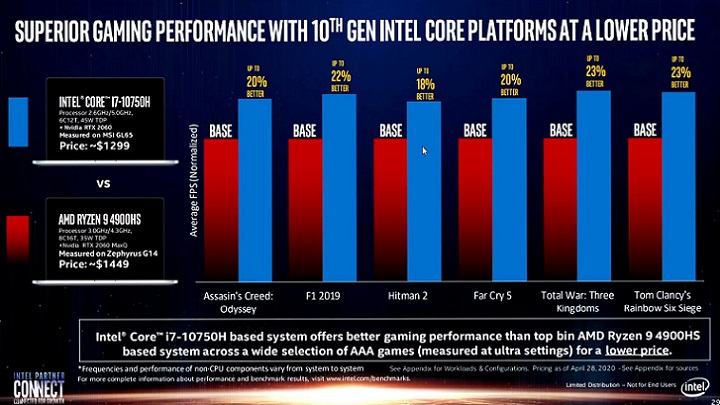Misleading Comparison of Intel and AMD CPU
Slides have leaked into the web, where Intel compares with AMD and claims that its laptop CPUs are more efficient in video games. However, Internet users do not fully agree with this.

We have to admit that in recent months, Ryzen processors have been named kings of cost-effectiveness and have proven to be cheaper and better than Intel products. In the laptop segment, things were worse, and for some time nothing suggested big changes - Intel dominated the field completely. However, the situation changed and AMD not only caught up with the competition, but also started to set the pace. Intel clearly felt the breath of the competition down its neck, because the 10th generation of their processors, according to the compant, brought big changes compared to their predecessors. Big enough for Intel to boast of them, as reported by Twitter user Rogame, known for being well informed about hardware.

Slides have leaked into the web, most likely coming from internal presentations to Intel's business partners (and certainly not intended to be made public). The company claims on them that in selected games their Core i7-10750H processor is up to 23% more efficient than the competing offer from AMD (Ryzen 9 4900HS), and a laptop with such a processor is 150 dollars cheaper. This sounds like the perfect answer to affordable and efficient AMD products. However, there is a catch - a notebook with Intel processor (MSI GL65) used an RTX 2060 GPU, while the one with AMD's CPU (Asus ROG Zephyrus G14) used an RTX 2060 MaxQ. This means that the comparison is not entirely fair, as the graphics card marked "MaxQ" is noticeably less efficient than the one used in the MSI GL65 laptop with 10th-gen i7 processor, which probably also translates into lower gaming performance. Therefore, we don't know how much of this advantage is due to the power of Intel's processor and how much from Nvidia's more efficient GPU.
In addition, the Asus ROG Zephyrus G14 laptop with AMD processor is much thinner (22.2mm vs. 27.5mm), and its GPU consumes much less power than the MSI proposal (65W vs 90W). Intel therefore compared two completely different hardware setups, with different graphics cards, which may be a bit in bad taste. There are different proposals on the market than the particular Asus chosen for testing - larger and those with full-fledged RTX 2060 card, not its weaker counterpart. This approach to testing and demonstrating superiority may come as a surprise and give the impression that Intel wants to prove its superiority over AMD at all costs.
0

Author: Mikolaj Laszkiewicz
Have been working at gamepressure.com since May 2020. First, he was a newsman in the Technology department, over time he began to get involved in games and journalism, as well as edit and supervise the Technology newsroom. He previously shared his thoughts on video games in, e.g. various thematic groups. A lawyer by education. He plays on everything and in everything, which can sometimes be reflected in his reviews. His favorite console is the Nintendo 3DS, he plays a new FIFA every year and tries to broaden his gaming horizons. Loves broadly understood computer equipment and disassembles everything that falls into his hands.
Latest News
- This is expected to be the biggest year in the company's history. Blizzard prepares an offensive that will overshadow previous years
- Bethesda envied CD Projekt RED? Starfield may undergo a Cyberpunk 2077-style metamorphosis
- Season 2 has just started, and Todd Howard is already writing the script for the third one. Fallout 5 will be changed by the TV show
- 5 games to grab on Amazon Prime Gaming. Among them, a collection of RPG classics
- My experience attending the 2025 Game Awards, and why I loved it

